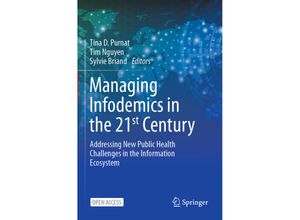This open access book on infodemic management reviews the current discussions about this
evolving area of public health from a variety of perspectives. Infodemic management is an
evidence-based practice underpinned by the science of infodemiology that offers guidance to
better manage pandemic and epidemic risks and more quickly tackle new and resurgent health
threats. Infodemic management has added much visibility and recognition for the importance of
social-behavioural sciences health communication participatory and human-centered approaches
and digital health as complementary scientific and practical approaches that also must be
strengthened in public health practice through a whole-of-society and whole information
ecosystem approach. This volume makes a case that health of the information ecosystem in the
digital age has emerged as the fourth ecosystem that public health is challenged by along with
the triad of environment-human-animal health. The book brings together scientists and
practitioners across disciplines to offer insights on infodemic management. The tools methods
analytics and interventions that they discuss in the context of acute health events also can
be applied to other public health areas. Topics covered include: People's Experience of
Information Overload and Its Impact on Infodemic Harms Smart Health! Expanding the Need for New
Literacies To Debunk or Not to Debunk? Correcting (Mis)information Partnering with Communities
for Effective Management of Health Emergencies Managing Infodemics in the 21st Century is
required reading for public health practitioners in need of an overview of this evolving field
of practice that has made major scientific and practical leaps forward since early 2020. Global
regional and local health authorities are increasingly recognizing the need to expand their
capacities for infodemic management in their efforts to better prepare for future health
emergencies. This book is the resource they need to build toward a mature infodemic management
process. The text also can be used as supplemental reading for graduate programs and courses in
public health.



